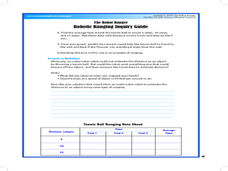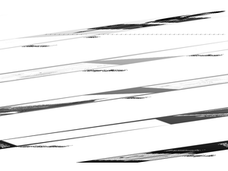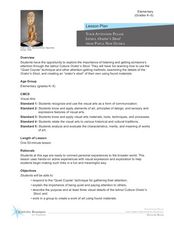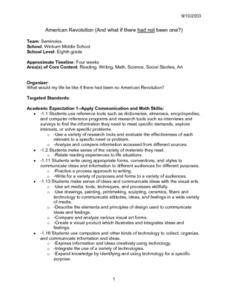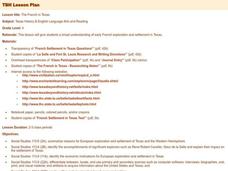Curated OER
Pleistocene Mammals
Students research the causes of the extinction of Pleistocene mammals. In this Pleistocene mammals lesson, students read essays to understand the Pleistocene epoch. Students write an essay about the personal impact of this epoch.
Curated OER
The Robot Ranger
Students participate in an experiment to understand how robotic systems can estimate distances. In this robotic ranger lesson, students measure the the time it takes for and object to move back and forth. Students will use a tennis...
Curated OER
Big Enough?
Students explore the concept of density and buoyancy. In this physics lesson, students discover the different factors that affect an object's density and buoyancy in water. Students conduct several investigations to further understand...
Curated OER
Deep Lights
Students investigate materials that emit light. In this deep ocean lesson, students compare and contrast materials that emit light under certain conditions and infer the light-producing process. They explain three ways this evidence is...
Curated OER
Living Light
Students explain bioluminescence. In this life science lesson, students discuss bioluminescence and conjure examples of organisms that carry this trait and how it is useful in their environment.
Curated OER
Shipwreck Mystery
Students draw inferences about a shipwreck. In this marine archaeologist lesson, students examine historical and archaeological data to draw inferences about the age and identity of shipwrecks.
Curated OER
Ship of the Line
Students discover boats by researching 18th century ships. In this Naval history lesson, students identify and describe the different components of an 18th century naval ship after researching information on the Internet. Students...
Curated OER
The Robot Archaeologist
High schoolers discover what is needed to program an underwater robot to complete a course of action. In this robot archaeologist instructional activity students design an archaeological strategy of an underwater vehicle.
Curated OER
Treasures in Jeopardy
Learners study how coral reefs can be protected from humans and their activities. In this conservation lesson students explain the benefits of coral reefs and what humans can do to help protect them.
Curated OER
Boom and Bust
Students investigate commercial fishery. In this fishery lesson, students describe stages in commercial fishery, interpret data and predict when a fisher stock is showing signs of overexploitation.
Curated OER
Animals of the Fire Ice
Students examine ocean life by identifying methane hydrates. In this ocean life lesson, students research organisms that live in the coldest, deepest parts of the ocean and live off methane hydrates. Students create a group...
Curated OER
Its OK To Be a Clod
Students describe factors that affect the solubility of a chemical substance in seawater. In this sea environment lesson, student explain how information on the solubility of a substance can be used to measure water currents. They will...
Curated OER
Wreck Detectives
Students investigate shipwrecks. In this marine archaeology lesson ,students collect data and make inferences about the causes of shipwrecks. Students work in groups to create their own model of a shipwreck using clay. Students then...
Curated OER
Marc Brown's Author Study: Arthur's Nose
Student's read Arthur's Nose and view the changes in Arthur's nose. In this Arthur lesson, students define difficult vocabulary, discuss choices and sing to the tune of Old MacDonald had a Farm. Students create a new nose for Arthur.
Curated OER
Fetch Me a Wave
Students explore waves and how they form. In this wave lesson students prepare a written report on waves and tsunamis then discuss what they learned.
Curated OER
Your Attention Please: Iatmul Orator's Stool
Learners investigate art by observing historical sculptures from New Guinea. For this art history lesson, students observe pictures of the "Orator's Stool"from Papua New Guinea, while identifying the small details that make it unique....
Curated OER
American Revolution (And What if There Had Not Been One?)
Eighth graders create scenes that might have existed if the American Revolution had not taken place. They use information they have gathered to plan, produce, and present a variety of products from the perspective of a British citizen in...
Curated OER
Haiku - Poetry of the Samurai Warrior
Students research the Samurai and their Haiku Writings. Students use internet research to gather information about the ancient Japanese Samurai. The students then create individual Haiku writings, and a cultural day is designated when...
Curated OER
The French in Texas
Fourth graders gain a broad understanding of early French exploration and settlement in Texas. They access websites imbedded in this plan. Using their notes, 4th graders work alone or with a partner to create an illustrated journal with...
Curated OER
Ecoregions of Texas
Seventh graders discuss why hunter-gatherers might have favored certain areas in which to live. In pairs, they research specific regions to examine in depth. Students present their eco-region vegetation findings (in this case Central...
Curated OER
Coral Mania
Students examine deep-sea coral. In this coral instructional activity, students identify the structure and function of a coral polyp. Students then create a model of a coral polyp.
Curated OER
Mystery of the Alaskan Seamounts
Students study seamounts and the processes that form them. In this Gulf of Alaska lesson students interpret data and investigate a hypothesis.
Curated OER
Exploring Deep Ocean Habitats: Alien Invasion
Students compare and contrast "alien species" and "invasive species."Students explain positive and negative impacts associated with introduction of non-native species, and give a specific example of species that produce t
Curated OER
The Benthic Drugstore
Students identify at least three pharmacologically- active chemicals derived from marine invertebrates. They describe the disease-fighting action of at least three pharmacologically-active chemicals derived from marine invertebrates.



